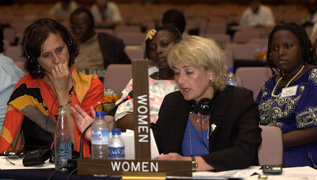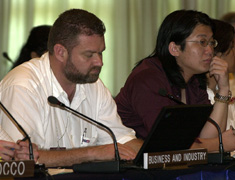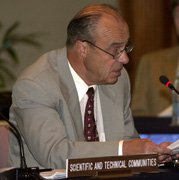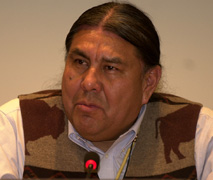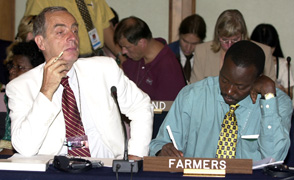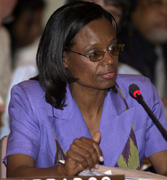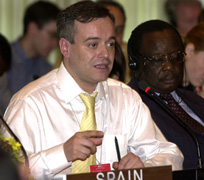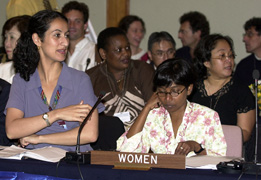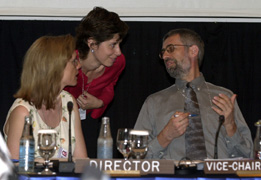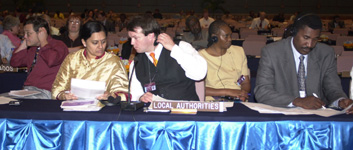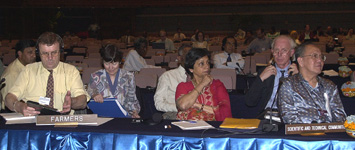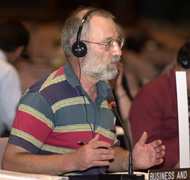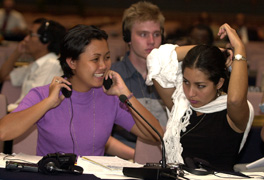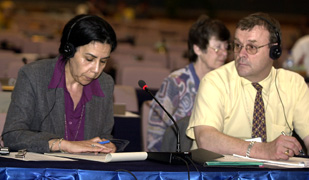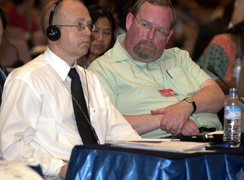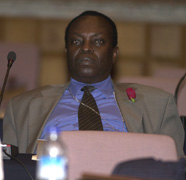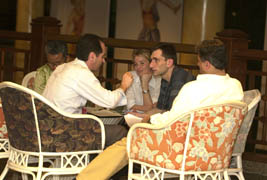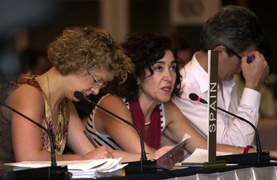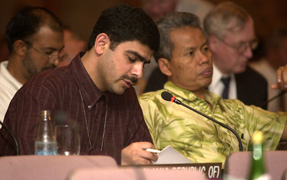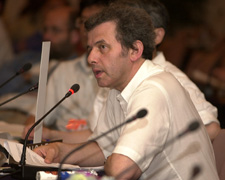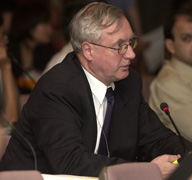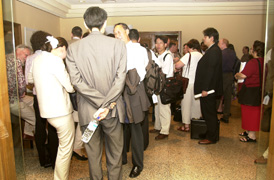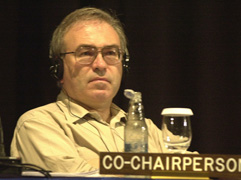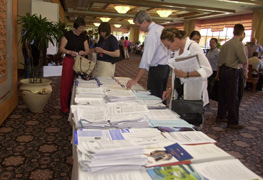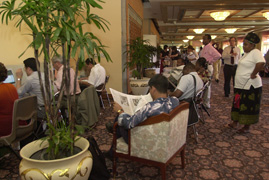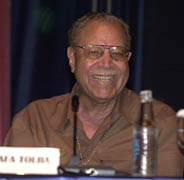 |
|
|
|
|||||||
|
The
World Summit on Sustainable Development
Bali,
Indonesia | 25 May - 7 June 2002 Fourth Preparatory Committee (WSSD PrepCom IV) Tuesday, 28 May
Delegates met in parallel morning and afternoon Multi-Stakeholder Dialogue sessions to address capacity-building for sustainable development and partnership initiatives. Working Groups I, II and III also met. In Working Group III on Sustainable Development Governance, delegates discussed the new Co-Chairs' paper. Contact groups on Africa, Oceans, Good Governance and Finance also convened. |
|
|
| Multi-Stakeholder Dialogue: Partnerships | |
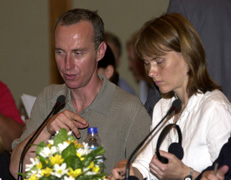 |
|
Steve Lennon, Business representative (far left), said partnerships must be built on the three pillars of sustainable development. He highlighted NEPAD as a partnership that could be used as a basis for action. |
|
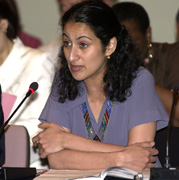 |
|
Erling Norrby, Science and Technological Community representative, highlighted global inequities in capacity to assimilate and generate new knowledge, and said there is no area where science and technology does not have a role. |
|
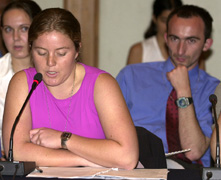 |
|
Tom Goldtooth, Indigenous Peoples' representative, said most forms of development have been resource industries that form partnerships with governments without consulting local peoples, which has resulted in ecological and cultural devastation and relocation of local populations. He said spiritual values and respect for Mother Earth is a foreign concept to private corporations, and said partnerships should be open and honest and carried out in good faith. |
|
|
Shalmali Guttal, NGO representative (near right), expressed concern that partnerships could coerce southern governments to accelerate the private sector's role in providing public services. She said partnerships should not be a substitute for Type 1 outcomes, and should address, inter alia, unemployment, poverty and HIV/AIDS. During the ensuing debate, another NGO representative (far right) asked that it be put on the record that the absence of intimidation and interference in internal affairs by certain countries is necessary in order to have a viable discussion on partnerships. |
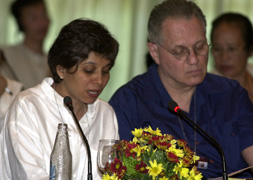 |
Nicola Stolfi, Farmer's representative, said the rise of global temperatures has affected world agricultural production, and emphasized the importance of looking for sources of renewable energy. He said the rules of international funding should be reformed, and emphasized the necessity of imposing a rating system for water. |
|
|
A representative
of Local Authorities said partnerships must be oriented toward inclusion,
fairness and transparency and should not be understood as a replacement
for institutional responsibilities. |
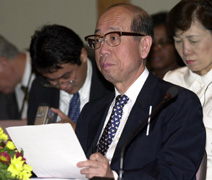 |
| St. Lucia discussed linkages between Type 1 and Type 2. She called for a code of conduct for transnational corporations when so many people are calling for corporate accountability. She supported a criteria and monitoring mechanism to ensure a contribution to sustainable development. She said partnerships should not be used to legitimize profit-making corporations. | |
|
Jonathan
Margolis, US, said partnerships must continue long beyond the Summit, and should include a self-reporting mechanism, in which the
CSD could play a role. He stressed the importance of addressing specific
partnerships and said the US
was committed to partnerships related to forests, energy, water, oceans,
agriculture, health and education.
|
 |
| The EU said partnerships must include a gender perspective and respect the rights of indigenous peoples and youth, or they will not function properly. He also said local authorities will have to do much of the implementing and will suffer the most if the initiatives are not well implemented. | |
|
Co-Chair
Diane Quarless, Jamaica (right), with Facilitator Ida Kopin from the
Sustainability Challenge Foundation (center), and
Zehra Aydin-Sipos, DESA Secretariat (far right)
|
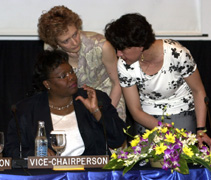 |
| Delegates during the morning session of the Multi-Stakeholder Dialogue on Partnerships | |
| Multi-Stakeholder Dialogue: Capacity Building | |
|
|
|
|
Delegates
during the Multi-Stakeholder Dialogue on Capacity Building were
asked to give inputs and share experience and lessons learned
from specific capacity building case studies.
|
|
|
|
|
| A
representative from Business and Industry presented lessons
learned from their capacity building experience concerning benefits in
health, education and employment to accrue benefits to communities
within five years.
|
|
|
Paul
Hohnen facilitated the Multi-Stakeholder Dialogue on Capacity Building
|
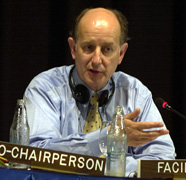 |
| Representatives from Youth supported ecovillages | |
|
Facilitator
Paul Hohnen in his closing remarks said that a large number of
issues remained unresolved
|
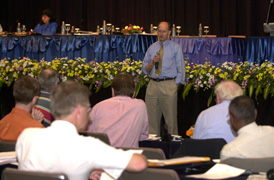 |
|
Farmers noted the importance of subsidies in food security and sovereignty issues |
|
|
Chair
of the Dialogue Kiyotaka Akasaka, Japan (near right)
|
 |
| Trade Unions representatives noted collaboration and partnership efforts underway with the Scientific and Technological Community | |
|
Uganda
discussed partnerships between government and local communities for
transfer of agricultural expertise
|
|
|
Delegates
from Madagascar making an intervention during the Dialogue
|
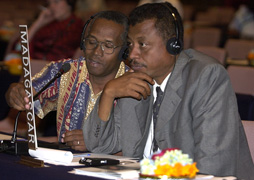 |
| Working Group I | |
|
Working
Group I Co-Chair Kiyo Akasaka, Japan
|
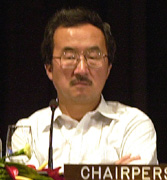 |
| The US, EU and G-77/China members meeting outside the Conference Room | |
| Working Group III: Governance | |
| Spain, for the EU, called for deleting reference to the provision of financial and technical resources regarding measures to strengthen sustainable development at all levels. | |
|
Beat Nobs, Switzerland Regarding a reference to rule of law, Switzerland supported keeping a reference to coherence and added language on respect for all internationally recognized human rights and fundamental freedoms, including the right to development. |
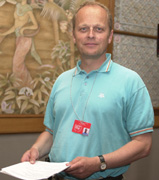 |
|
Iran, speaking for the G-77/China on governance, with Indonesia The G-77/China said that all references to the goals of sustainable development should be as reflected in Agenda 21. |
|
|
Tibor
Faragó, Hungary proposed language on promoting initiatives
to ensure coherence and mutual support between the rules of
the multilateral trading system and the rules of MEAs and that are
consistent with the goals of sustainable development and with the
work programme agreed through the WTO
|
|
| Norway called for language on promoting transparency and effective involvement and accountability of government and of civil society in the implementation of Agenda 21 and sustainable development decision making. | |
| Contact Group: Oceans | |
| Delegates outside the Conference Room prior to the convening of the contact group on oceans | |
|
Contact
Group: Africa
|
|
|
|
Working Group II Co-Chair Richard Ballhorn chaired the contact group on Africa
|
|
Miscellaneous
Photos:
|
|
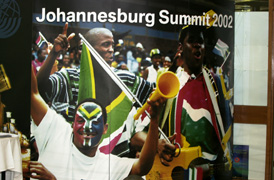 |
|
| Checking for new documents | |
|
Delegates
in one of the lounge areas in the Conference Center
|
|
| Mustafa Tolba, former Executive Director of UNEP | |
|
Hanging
out in the corridors
|
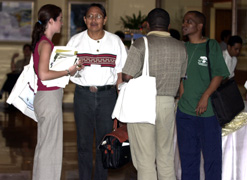 |
|
|
|
Back to Linkages home - Visit IISDnet
- Send e-mail to ENB
©
2002, IISD. All rights reserved.
